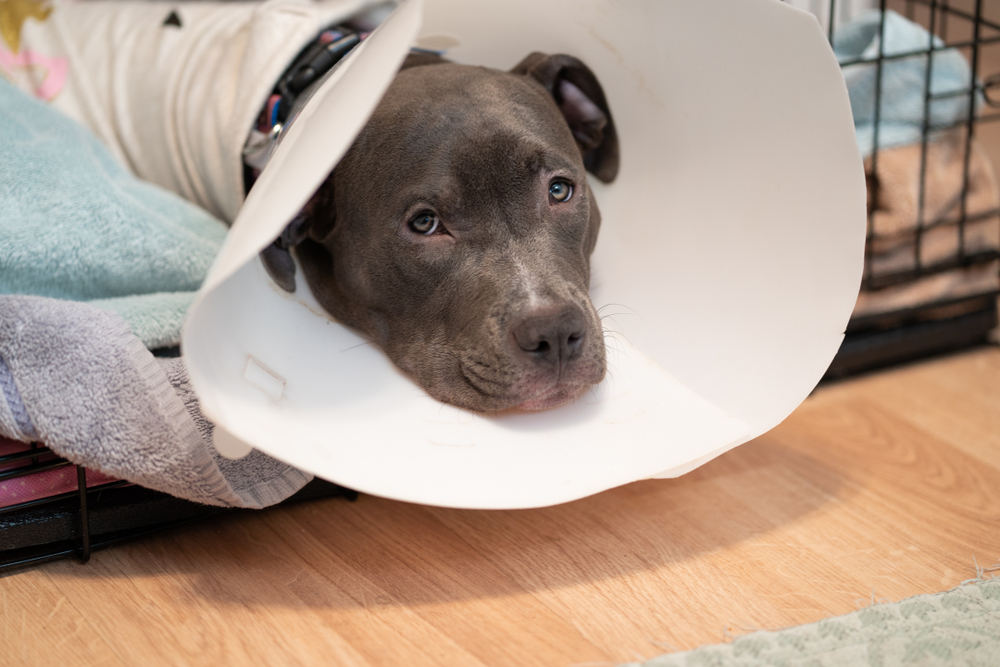PostOp Pup: How Long Does It Take for a Dog to Recover from Surgery?

After you get the news that your pet requires surgery, it is understandable to be worried. What is the risk and how long will it take for your dog to recover from surgery? Recovery time varies, depending on the type of surgery and your dog’s needs during rehabilitation.
Your friends at Oakland Veterinary Referral Services want to explore with you ways in which you can help your dog successfully recover. We also explain the process and typical dog surgery recovery times for healing.
Post-Operative Pet Care and Recovery
After any surgery, minor or major, your pet will be closely monitored in the recovery area by our veterinary surgical team. After anesthesia, we ensure that vitals are normal and your pet is alert before they go home. Your veterinarian will thoroughly explain what you need to do to take care of your pet during their recovery at home. They will provide instructions on pain management and any medications they will require.
In terms of recovery time, much depends on the complexity of the surgery. For example, a spay is more invasive than a neuter surgery, and will likely take two weeks for your female dog’s incisions to heal. Most dogs who are neutered generally resume activities within a week or so, but must be monitored so that they don’t disrupt the healing process.
An orthopedic surgery, on the other hand, such as a TPLO, requires weeks of rest and gradual physical rehabilitation for the pet to be in full recovery. Most soft tissue surgeries can expect a two-three week recovery time for pets to resume normal exercise and daily activities. Of course, much of this depends on following instructions correctly and making sure your pet is otherwise healthy prior to the surgery.
Making Recovery a Breeze
One of the best ways to encourage a speedy and successful recovery for your favorite Fido after surgery is through great aftercare. Along with following the veterinary surgeon’s instructions closely, you will be instrumental by being your dog’s best nurse. You can do this by practicing the following rules of canine recovery.
- Restrict movement – Over time, your veterinarian will allow you to take short walks with your dog, but the first few weeks require exercise restriction. Some dogs will need to be penned or crated, so that they don’t disrupt the surgical site. Even if your pet had a routine spay or neuter, they will need to take it easy to not cause additional injuries during the healing process.
- Feed them an optimal postoperative diet – For the first day or so, your dog may not be feeling that great and will need a light and easy diet. Your surgeon may recommend cooked chicken with steamed white rice, or a small amount of wet food. Don’t overfeed them or offer any people food, since their stomach is still queasy from the operation.
- Manage your dog’s pain – Through the use of antiinflammatories and certain pain medications, the hope is that your dog will not be in any discomfort. For the first few days, though, they may experience mild pain. Monitor your pet’s behavior and alert us if they seem uncomfortable or are not eating, they are whining or howling, unable to rest, and so on.
- Support your dog’s body – Use added padding and blankets that do not have abrasive materials for extra comfort. Place extra bedding or an orthopedic style bed under your pet to cushion the joints, muscles, and body weight. Make sure the temperature isn’t too warm or chilly.
- Maintain the health of the surgical site – Ensure that your pet doesn’t lick or chew on their sutures. Keep the area bandaged and dry, unless otherwise instructed. You may need to change bandages, per your veterinarian’s instructions. Use an E-collar or neck donut to keep your dog from getting at the wound site.
- Maintain follow-up appointments – After a period of time goes by, we will need to see your dog for a follow up. This checkup will give us insight into how your dog is doing and if there are any issues. It’s also a great time for you to ask any questions about giving your pet the best at home care.
Questions Regarding Dog Surgery Recovery Times
If your best friend has an upcoming surgery and you have any questions about how long it will take your dog to recover from surgery, we are always here to help. Recovery times for dogs vary greatly, with many variables to consider. With the right at home care and follow up with your veterinarian, your pet will be back on their paws and wagging their tail in no time! Please contact our team for more information.


